MUSINGS FROM MANCHESTER AND MEMPHIS — Not to overstate the omens, but the past two weeks have seen some lousy weather, both in New Hampshire, whose presidential primary accomplished some crucial winnowing down of the candidate field, and here in Tennessee, where voters get to make what could be an even more defining choice in less than two weeks.
In the meantime, along with more cold, rainy weather, and maybe even some sleet and snow, we are quite likely to get some close encounters with the candidates — like Donald J. Trump, the reality TV star and Manhattan real estate mogul, who, on the eve of the New Hampshire voting, addressed a rally of his supporters with the following exhortation: “I want to finish up, because you’ve got a bad evening out there. You have to do me a favor. I don’t really care if you get hurt or not, but I want you to last ’til tomorrow. So don’t get hurt!”
That characteristically cheeky bit of tough love was uttered at the Verizon Wireless Arena in Manchester, before an audience of thousands who had crammed into the arena on the night of what Trump, more or less accurately, had called a blizzard, one which, he had proclaimed upon arriving late, had caused at least seven accidents outside.
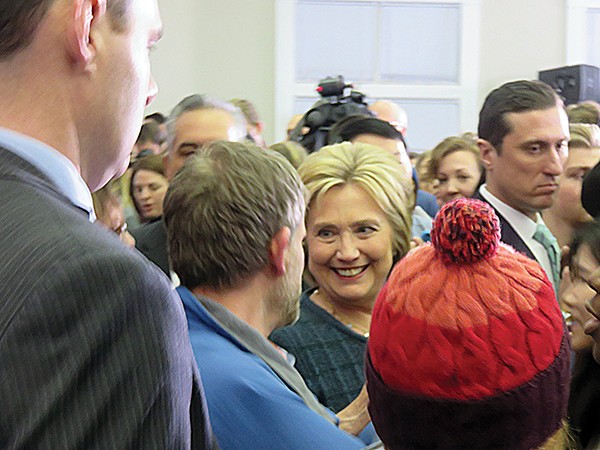
Hillary Clinton among the crowd at Henniker
Not that Trump’s exhortation had been his most memorable statement of the night. Just minutes earlier, following half an hour or more of heady ego-tripping boasts (all free of any taint of political-platform logic), The Donald lambasted Democratic candidate Hillary Clinton and Republican rival Ted Cruz for taking issue with the “tone” of his stump speeches. Whereupon, via a reference to Cruz’s performance at a just-concluded debate event of GOP candidates, Trump upped the verbal ante.
TRUMP: “They asked Ted Cruz a serious question: ‘What do you think about waterboarding?’ and, I said, OK, honestly, I thought he would say, ‘Absolutely.’ And he didn’t. He said, ‘Well …’ You know he was concerned about the answer because some people …”
Distracted by a woman supporter in one of the front rows, Trump interrupted himself. Pointing to the woman, he said, “She just said a terrible thing. You know what she said? Shout it out, because I don’t want to say …”
WOMAN: “He’s a pussy!”
TRUMP (chuckling): “OK. You’re not allowed to say … and I never expect to hear that from you again. She said … (mock scolding tone) … I never expect to hear that from you again…” (crowd now chuckling along with him) … She said, ‘He’s a pussy!'”
What ensued from the crowd, not all of whom had heard the interloper distinctly but all of whom now heard Trump loud and clear, was first shock, then awe, then delight, then pandemonium and chants of “TRUMP! TRUMP! TRUMP!” It was Donald Trump’s latest Gettysburg moment in his campaign to Make America Great Again.
It would surely be a waste if the surprise front-runner in Republican ranks should — in the interval between now and Tuesday, March 1st, when Tennessee and almost a dozen other states hold primary or caucus events — choose to bypass Memphis, known to music-lovers and NBA fans alike as a citadel of Grit ‘n’ Grind, wide open to down-homey talk and artists of the vernacular.
Caucuses in Nevada and primaries in South Carolina will have intervened between now and March 1st, and each of those states will have had an effect on candidate fortunes, but nothing comparable to the scale of what will happen on “Super Tuesday,” as the date is called on the 2016 political calendar.
By the close of voting on March 1st, we should know if Trump has maintained his edge over Texas Senator Cruz, a chilly avatar of the hard right almost as unpopular with the GOP establishment as Trump himself, the grand interloper, and we should know also which one of the three establishment-friendly candidates — former Florida governor Jeb Bush, Florida Senator Marco Rubio, and Ohio governor John Kasich — has been able to survive for an expected three-way battle that could last all the way ’til July, when the Republican National Convention convenes in Cleveland.
There’s an ongoing battle between Democratic contenders, too — former First Lady, Senator, and Secretary of State Hillary Clinton and septuagenarian Senator Bernie Sanders of Vermont, a self-professed “democratic socialist” whose advent as a serious competitor in 2016 has been as breathtakingly unexpected as was Trump’s, but whose proposed reform policies are as rigorously defined as Trump’s are amorphous.
Both Trump and Sanders are considered outliers, both have developed bona fide followings, and both have been identified by political pundits, somewhat lazily, as exponents of an undefined “anger” in the body politic. The term may fairly characterize Trump’s generalized complaint that “we [Americans] don’t win at anything any more,” and Hillary Clinton has attached it to Sanders in a widely publicized sound bite suggesting that anger is all well and good, but “Where’s the plan?”
Arguably, Sanders’ plan is fairly specific. Among other things, his version of a “political revolution” would provide for free education at public colleges, universal health care (under the rubric “Medicare for All”), a return to strict controls over both political spending and banking practices, and a crash program to renew the nation’s infrastructure. All this to be paid for in large part by “a tax on Wall Street speculation.”
It may be pie in the sky, as Clinton and her supporters imply, since it is hard to see how any program so thorough-going could make its way past Republican road blocks in Congress. But it is real pie, all the same. Or, to amend the metaphor, food-wise, it is whole-loaf reform, reasonably close to everything the term “socialism” implies.
It is no accident that Bill Clinton, spouse of candidate Clinton and a former president who still commands wide popularity, both within Democratic ranks and without, played off on that metaphor last week during a hastily called rally for his wife in Memphis, citing a saying of another former Democratic president, Lyndon Johnson, that anyone who would spurn half a loaf “has never been hungry.”
It is no accident, either, that former president Clinton chose to come to Memphis in the run-up to Super Tuesday. Hillary Clinton’s game plan is to prevail here and in other so-called “SEC’ [for Southeastern Conference] states on March 1st, thereby putting a comfortable distance between herself and Sanders (who tied her in the Iowa caucuses and beat her soundly in New Hampshire), and to do so largely on the basis of massive support from black voters, whose loyalty to the Clintons has been assumed for the last generation and a half.
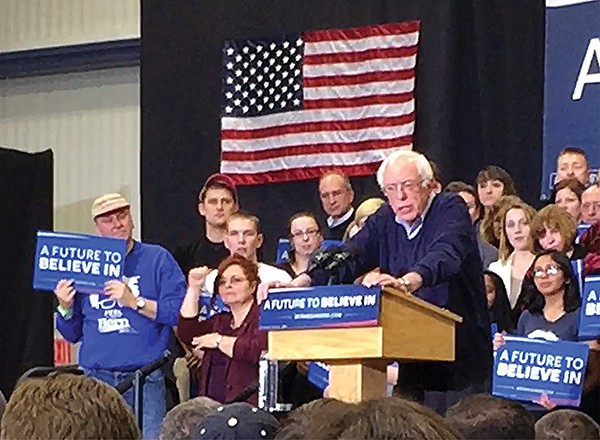
Bernie Sanders lays out his plan for a revolution
Whereas Sanders is correctly considered a socialist (though hardly in the now-obsolete Marxist-Leninist sense of the term), Clinton is with equal appropriateness best considered a liberal. Her politics are avowedly those of compromise, and in several different senses of that word. As her husband pointed out in last week’s Memphis rally (held at Whitehaven High School), she is one who can work across the aisle (or, as the former president put it, can “stand her ground” while seeking “common ground”). President Clinton cited as an example her cosponsorship, with arch-conservative GOP House majority leader Tom DeLay, of legislation to facilitate post-infancy adoptions.
And Secretary Clinton is, for better or for worse, willing to render unto Caesar —accepting the insurance-company proprietorship and not quite universal health-care coverage of the Affordable Care Act as the continuing basis of health-care reform, and advocating the means-testing of college tuition aid rather than blanket guarantees of free education, while endorsing both choices as limited but feasible in their application. She is consistently faulted by Sanders for her acceptance of both large speaking fees from organizations like the Goldman Sachs financial house and campaign assistance from a “Super-PAC.”
For all that, there is significant policy overlap between the two Democrats, both of whom seek significant criminal justice reform, a raise in the minimum wage, and workplace equality for women, while approving same-sex marriage.
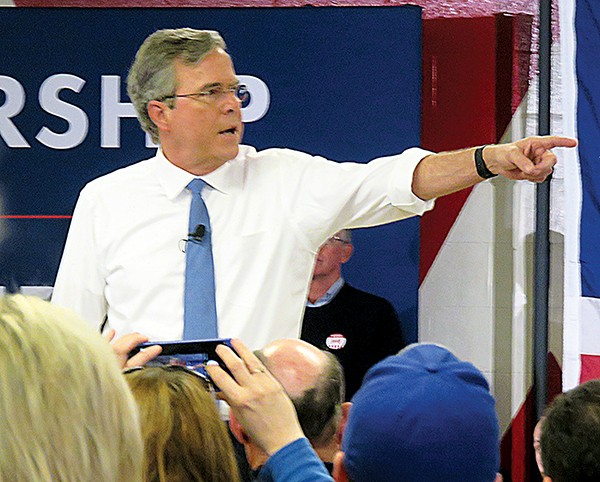
Jeb Bush putters along at Salem
There is a sameness of outlook among the Republicans, too, along with some distinguishing gradations. All by himself, Trump largely scuttled the GOP’s expressed resolve, after the party’s debacle in the 2012 presidential race, to court the nation’s growing Latino vote. When on June 16th, at his own Trump Tower in New York, he rode down on an escalator for a ceremonial announcement of candidacy, Trump also descended into a round of vigorous bashing of Mexicans as rapists and boundary breakers.
When his invective not only did not damn his candidacy but instead resulted in good poll numbers, the other Republican candidates basically followed suit, and stiff-necked resistance to any form of immigration reform is now a given among them, including the two sons of Cuban emigres, Cruz and Rubio, the latter of whom had once sponsored, but has since renounced, a path to legalization for selected illegal immigrants.
Other aspects of the GOP candidates’ litany include a resolve to terminate “Obamacare,” their preferred name for the Affordable Care Act; a pro-life stance on abortion; continued tax cuts for the corporate sector; opposition to same-sex marriage; holding the line on the minimum wage; and condemnation of the deal reached with Iran, forestalling that country’s pursuit of nuclear weapons while phasing out economic sanctions against it.
Of the Republicans still running, only Kasich, who finished a respectable second to Trump in New Hampshire, attempts to take moderate versions of these positions or to suggest that bipartisan solutions are still possible, and he tends to avoid the ritual Hillary and Obama-bashing of the others, which is virulent and nonstop. That fact, plus his relatively cash-poor status, probably doom him to lose the battle with Bush and Rubio for the establishment-backed position in a final three-way for the nomination with Trump and Cruz.
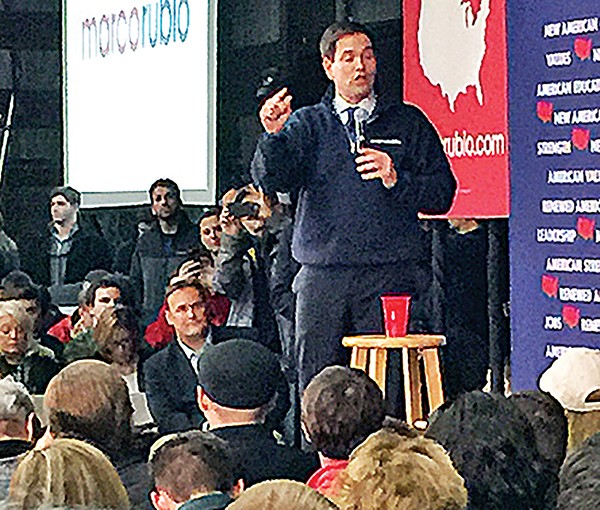
Florida Senator Marco Rubio is a Republican Ichabod Crane
Rubio, who had been considered a rising star after his strong third-place finish in Iowa, sagged in the polls after being all but eviscerated in the last New Hampshire debate by the now-absent New Jersey governor Chris Christie, who played Brom Bones bully-boy to Rubio’s Ichabod Crane, not only exposing Rubio’s tendency to repeat his own talking points, parrot-like, but actually unnerving the Floridian into doing so. It remains to be seen whether Rubio, who made a strong comeback in last weekend’s South Carolina debate, can regain his former status.
The real unknown quantity is Jeb Bush, yet another scion of a dynastic GOP clan, who hasn’t won, placed, or showed yet in any poll or vote for the record but putters along in striking range on the strength of his blue-ribbon connections, the family name, and enough of a campaign bankroll to hang in, right up to what could turn out to be an old-fashioned brokered convention.
If Trump and Sanders had not existed, they might have had to be invented. The mere presence of these two outliers in the 2016 presidential race, not to mention their wholly unanticipated viability, has utterly confounded the expectations of party regulars and the pundit class.
Sanders’ vision of a revolution directed at what he sees as control of the social and political process by an oligarchy has not only generated the beginning of a movement among Democrats and independents, it has had unexpected resonance in Republican ranks as well — and where you would least expect to find it.
The first week of February, which was also the last week of the New Hampshire primary, was an especially brutal one, weather-wise. Temperatures flirted with single digits all week (they would eventually get there), snow fell in four- or five-foot heaps almost everywhere, visibility largely vanished along with the day’s light, and ice coated the state’s highways and walkways in thick and perilous veneers.
One reason for the New Hampshire primary’s historical relevance has been the state’s relatively small size, with most of the major towns and cities located in its southern rim, a circumstance that makes candidates and their campaign events unusually accessible to anyone who cares to seek them out.
What is remarkable is that, even when the weather was at its most treacherous, people still turned out in droves, not only New Hampshire natives, but imports from neighboring and even distant states, all anxious to catch the final act of this quadrennial New England drama.
I found this out on Friday, February 5th, when I decided to brave the elements and check out a Ted Cruz town hall in a school gymnasium some six miles from my Red Roof Inn in Salem, New Hampshire, hard by the border with Massachusetts. Creeping along on the moonless night with a death grip on the steering wheel of my rental car, I finally got to the site after a half hour’s driving along roadways that the town’s fleet of snowplows were even then trying to work in shape.
I was astonished to find that, even on this night and even for Cruz, who was not considered a real contender in the primary despite his victory in the previous week’s Iowa caucuses and so heavily influenced by religious fundamentalists, there was a turnaway crowd, with no parking available except on especially slippery side streets, blocks away.
Once inside, I found a place in an overflow room and heard Cruz go through his usual hard-nosed litany of conservative positions on social, fiscal, international, and philosophical issues. But Cruz — yes, Cruz — has a populist side as well. He spoke to his crowd of wanting to rebuild “the old Reagan coalition,” one composed of “conservatives, evangelicals, libertarians, Reagan Democrats, and young people.” Because, as he said, “you’ve got to build a broad and diverse coalition to win.”
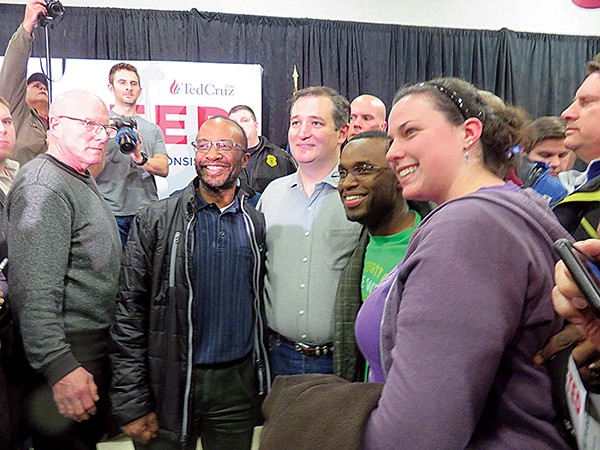
Ted Cruz with supporters at Salem
All of that was standard boilerplate, but then came a statement from Cruz that was downright shocking — and a key to his wiliness as well as a partial explanation for his better-than-expected electoral success so far. He mentioned Bernie Sanders, he of the youthful following and the resounding call with which Sanders begins each speech: “I think you want a political revolution.”
Said Cruz to his true believers: “I agree with a lot of what Bernie says about the problem, that Washington is fundamentally corrupt, that politicians are on the take, that the system is rigged for the giant corporations and Wall Street. I agree with all of that. Where I disagree with Bernie is in the solution. If government is corrupt, the answer isn’t a heck of a lot more government.”
OK, so those last two sentences amount to a rhetorical bait and switch — a take-out, away from the idea of radical public action toward old-fashioned notions of laissez-faire. The point is that Cruz, too, can sense the revolution in the air. It means something that even this dark knight of the right can recognize it.
It means something, too, that Trump, the same Trump who in last Saturday’s GOP debate unloosed the kind of intense attack on the G.W. Bush administration’s “lies” about WMDs in Iraq that most partisan Democrats have shied away from (think John Kerry … or Hillary) … that that Donald Trump begins and ends his speeches to the opening guitar strains of the Beatles’ “Revolution.”
Who knows? Maybe, lousy weather or no in this often toxic political season, some version of that hopey-changey stuff so decried by Sarah Palin might just win out after all.
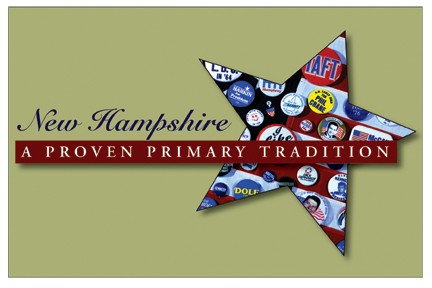
 JB
JB 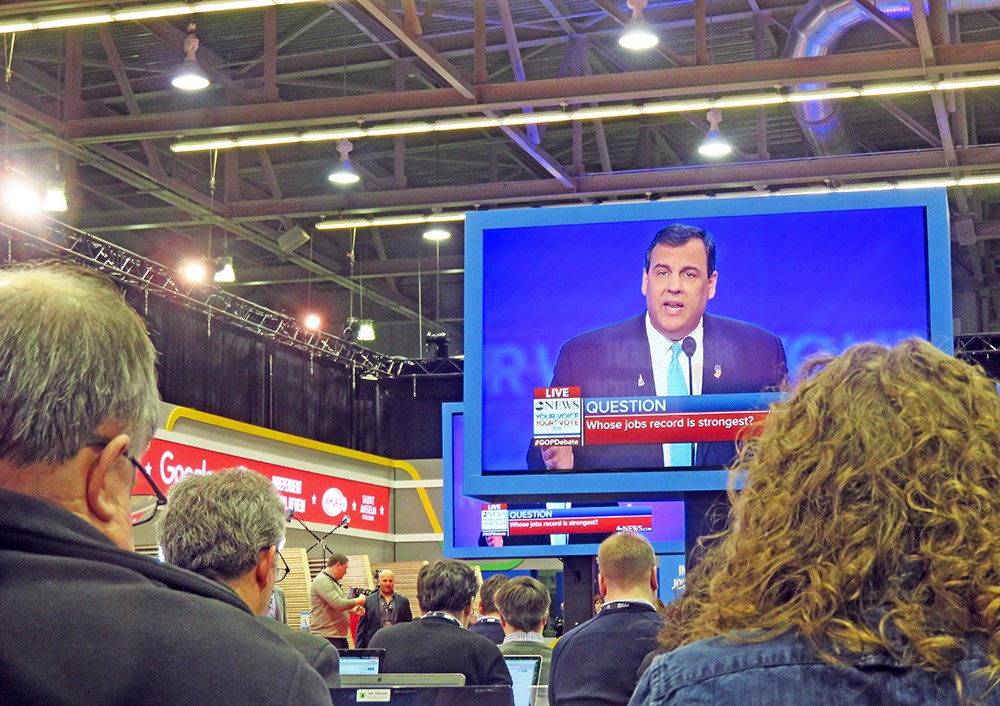 JB
JB 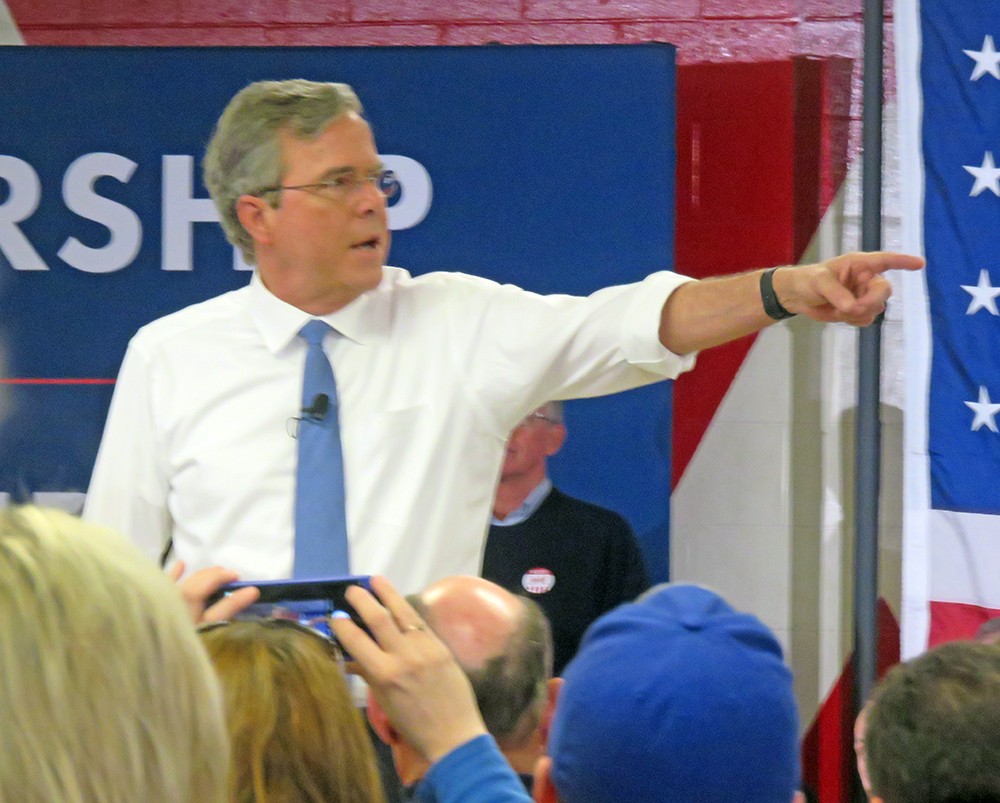 JB
JB 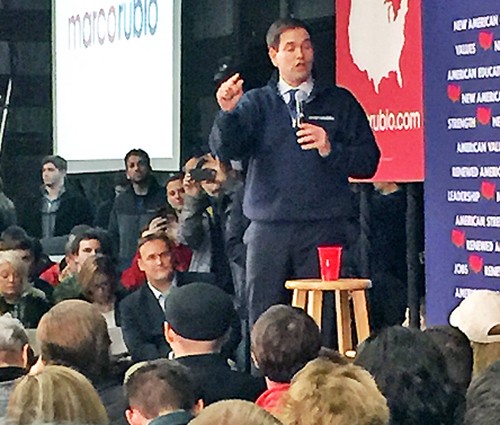 JB
JB 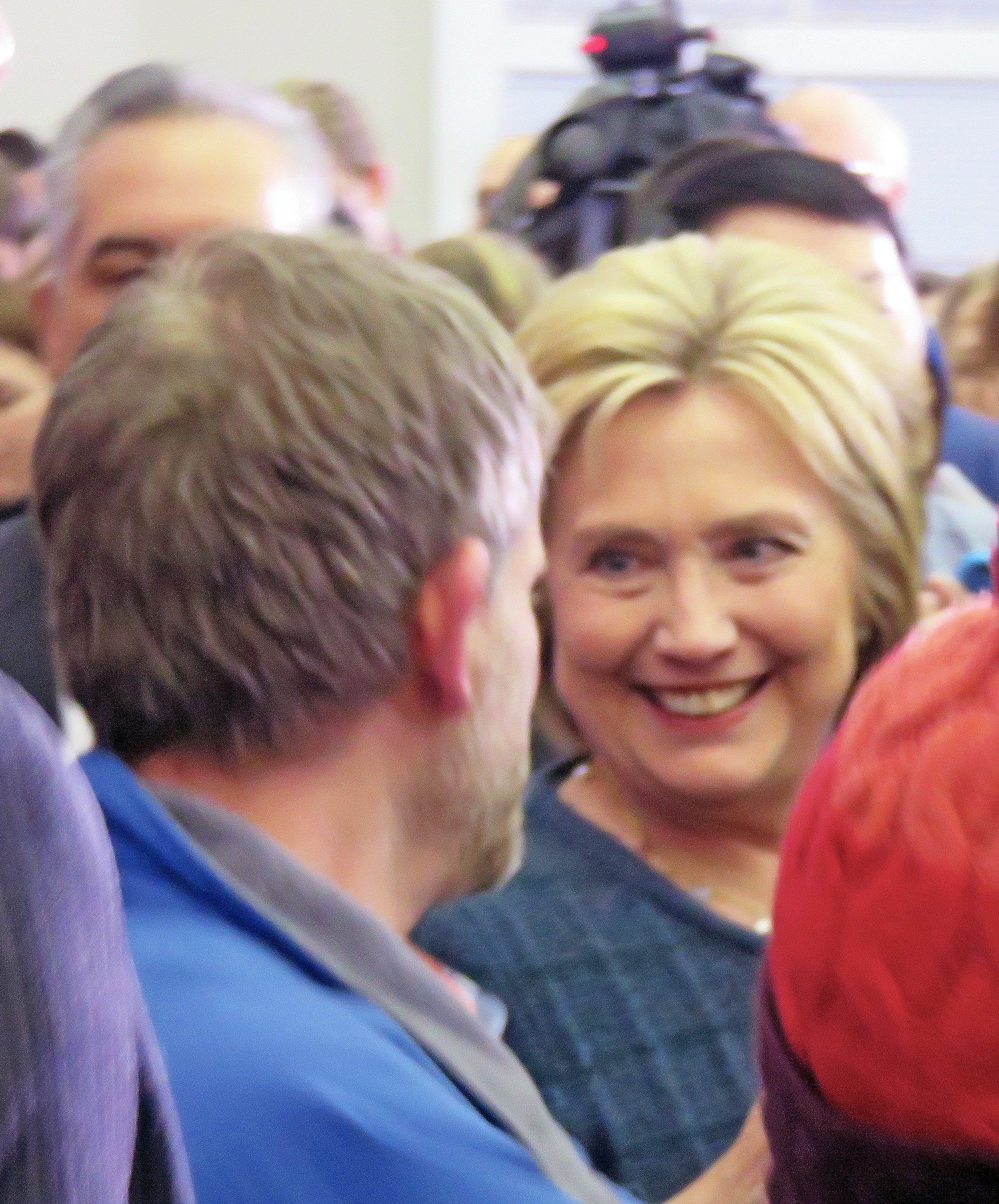 JB
JB 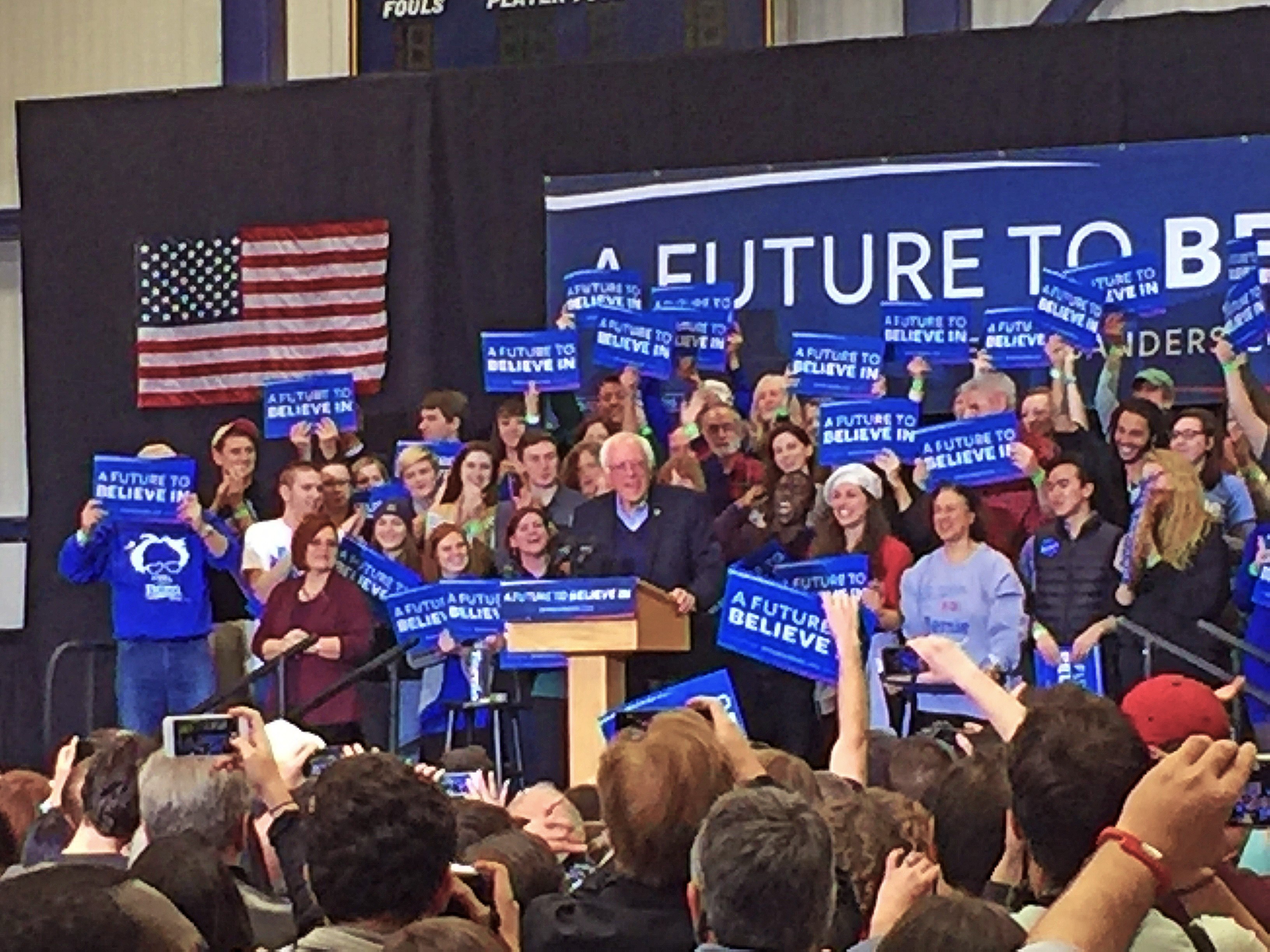 JB
JB 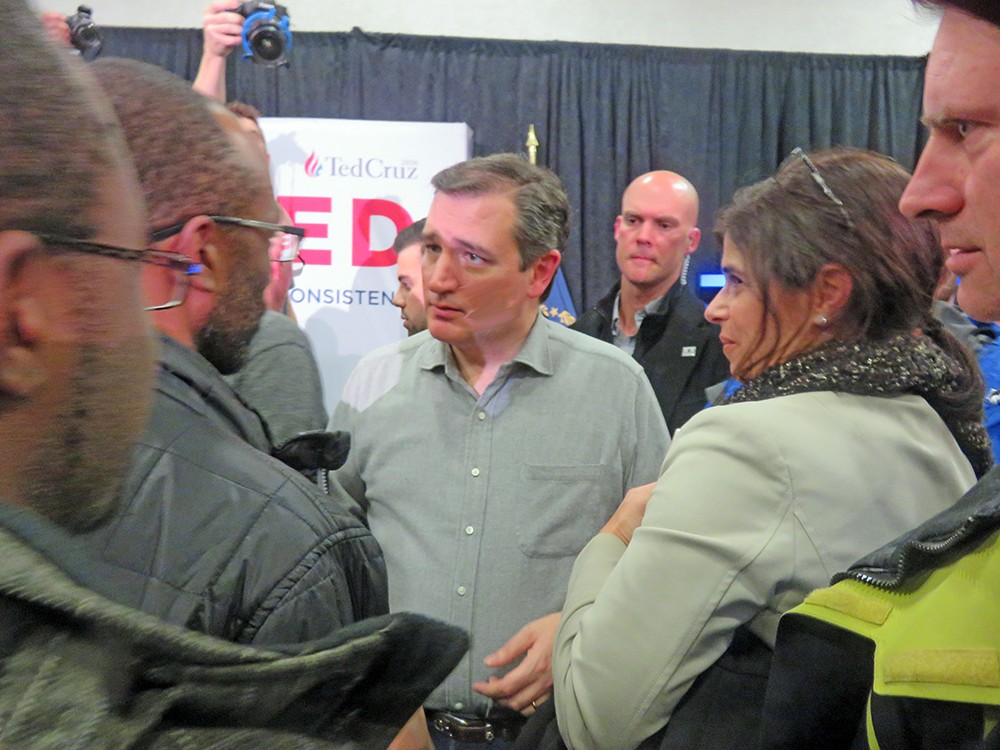 JB
JB